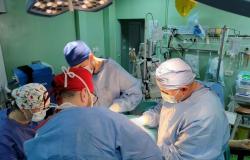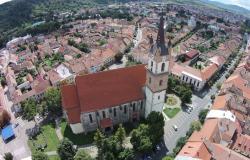Romania became a member of the North Atlantic Treaty Organization (NATO), with the submission of the accession instrument to the State Department of the United States of America in Washington, DC, on March 29, 2004. On April 2, 2004, 20 years ago, the ceremony of raising the Romanian flag took place at the NATO headquarters in Brussels.
The IRES study aimed to identify the perceptions of Romanians towards the political-military alliance whose establishment will be 75 years old in 2024 and analyzed their attitudes regarding the general climate in Romania and the region, in the context of the war in Ukraine and the polycrises that have manifested themselves, in recent years, at the local, regional and global level.
IRES SURVEY: 20 years since Romania’s ENTRY into NATO
Some of the conclusions of the study: NATO enjoys high notoriety in Romania, but the topic of NATO is of relatively low interest for Romanian citizens. Although one out of two Romanians declares to be informed about NATO’s activity, in reality there is a major information deficit in this direction. Only 7% of the survey participants correctly indicate the year of Romania’s entry into NATO.
Romania’s presence in NATO is perceived by Romanians as a correct and beneficial decision for our country which is now seen as better defended, in its capacity as a NATO ally, with a better trained and better equipped army and with external relations more solid.
The latest articles on Cluj24
Among the minuses of belonging to the military organization are partially mentioned the deterioration of the relationship with Russia and the need to spend more money on defense. The participation of the Romanian military in NATO’s theaters of operations is seen as an advantage rather than a disadvantage.
The majority of Romanians are convinced that art. 5 will work if Romania is attacked, although 14% of respondents have reservations that the All for one, one for all principle will work in the case of Romania. The situation is relatively similar if Romania were to be asked to intervene for another NATO country, with the proportion of skeptics increasing to almost 30%.
Concern about the possibility of a war in the region is present among Romanians. More than half of Romanians support Romania’s involvement in the event of a NATO-Russia conflict.
THE POSSIBILITY OF ROMANIA BEING INVOLVED IN A WAR WORRIES ROMANIANS
When they are asked what are the aspects that worry them, personally, at present, Romanians mention, first of all, those related to their everyday life: the cost of living (27%) and poverty (18% ) are most often mentioned, followed by the concern regarding Romania’s involvement in a war (13%). The economic crisis (9%) and the lack of jobs (8%) are also worrying for Romanians, as well as political instability (6%), disinformation and the propagation of false information (5%) or inequity in Romanian society (5% ).
When the concerns are looked at from the perspective of the country and the people, the dominant ones are related to the low standard of living, poverty, inflation (25%) and the risk of Romania being involved in a war (18%).
More than a third of the participants in the IRES study (36%) say that they are very worried about the possibility that Romania will be involved in a military conflict in the coming years. One out of four Romanians says they are quite worried about this aspect, while four out of 10 are a little or not at all worried.
More than four out of ten Romanians (47%) believe in the possibility of NATO entering into a military conflict with Russia in the near future. A third (36%) think this hypothesis is unlikely, and 13% think it is not possible.
In the event of a NATO-Russia conflict, more than half of Romanians (54%) believe that Romania should get involved. 42% support the opposite.
In the event of the escalation of the conflict in Ukraine and the involvement of NATO, almost four in 10 (38%) male respondents say they would enlist as a volunteer or reservist (as applicable) to defend their country. 44% would choose to stay in the country, but not join the army, and 9% of the interviewees say they would leave Romania in this case. Another 9% chose not to answer or said they did not know the answer to this question.


ROMANIANS SUPPORT HIGHER SPENDING FOR THE ARMY
In the opinion of the majority of survey participants, the current technical equipment of the Romanian Army is not good; 13% think it is very poor, one in five think it is poor, one in five say it is neither good nor poor, a quarter think it is good, and 8% rate it as excellent.
In contrast, the training of military personnel in Romania is evaluated more favorably; if one out of 10 Romanians thinks that the training of the military is very weak, and 17% that it is weak, four out of ten appreciate it as good, and 13% that it is excellent.
Almost three-quarters of those surveyed agree that Romania should spend more money from the state budget on defense, and two-thirds say that most of the funds should be spent on equipping the Romanian Army with modern equipment.


Although there is majority support for a professional army, the idea of reintroducing compulsory military service is gaining support, with 44% of respondents saying this would be the better solution.


INTEREST AND INFORMATION OF ROMANIANS REGARDING NATO
The notoriety of the North Atlantic Alliance is very high in Romania, with 98% of the participants in the study declaring that they have heard of NATO.
Romanians’ interest in information related to NATO, more than half (57%) of those surveyed say they are little or not at all interested, while 42% declare themselves interested in it. Women are less interested, but also young people or respondents with a low level of education.
When it comes to the self-assessment of the degree of information regarding NATO’s activity, more than half of Romanians (51%) claim that they are quite and very well informed, while 48% consider themselves to be rather poorly or even not at all informed. Elderly men and people with higher education rate themselves as better informed, while women, young people and those aged up to 50, but also respondents with low education admit that they are not so well informed about the activity NATO.
Television is the channel through which most Romanians (81%) find out about NATO activity, followed by websites (53%), social networks (47%), newspapers (33%) or radio ( 31%).
The year in which Romania was accepted into NATO is not known by many Romanians, only 7% correctly answered the year 2004, one in five incorrectly indicates different years, and almost two thirds do not know the answer or did not want to answer this question.


ROMANIA IN NATO – ADVANTAGES AND DISADVANTAGES
8 out of 10 Romanians think that joining NATO was a good thing for our country, while 15% think it was a bad thing. Those who categorize Romania’s entry into NATO as a bad thing are people aged between 36 and 50, respondents with low education and those who live in rural areas.
Among the perceived advantages of Romania’s entry into NATO, the country’s better defense is the strongest (82%), followed by the Romanian Army being equipped with better military equipment (79%), the existence of better external relations (78%) or the one regarding the better training of the Romanian military (70%). 5% of the respondents claim that there is no advantage of Romania joining NATO.


As for the disadvantages with which Romanians associate Romania’s entry into NATO, they are less consistent. In first place is the worse relationship with Russia (59%), the need to allocate more funds from the state budget for defense (51%) or the obligation for Romania to participate with soldiers in NATO actions in other countries (44%) . 15% of the respondents say that there is no disadvantage of Romania joining NATO.


ROMANIA IN NATO – ROLES AND OBLIGATIONS
More than 8 out of 10 Romanians are sure that NATO will defend Romania if our country is attacked. One in 10, however, believes otherwise.
Those who believe that Romania will be defended by NATO are, in higher proportions than the average, the elderly and those with higher education.
At the same time, however, when asked if they would agree with Romania intervening to defend another member state in the event that it were attacked, two-thirds agree, but more than a quarter are against . People aged between 36 and 50, respondents with low education and those who live in rural areas are found in higher proportions among those who do not support Romania defending another NATO state in case of need.


Almost three-quarters of the participants in the survey say that they agree with the military presence of other NATO countries on Romanian territory, but a quarter say the opposite. Among them, we find in higher proportions those between the ages of 36 and 50, respondents with low education and those who live in Transylvania and Banat.
In fact, 6 out of 10 Romanians believe that due to the presence of the military of other NATO countries on Romanian territory, our country is safer, while almost one in 5 respondents believe that, on the contrary, it is less safe, and 18% do not notice a safety difference.
8 out of 10 participants in the survey consider the existence in Romania of a military base such as the one at Mihail Kogălniceanu, which recently entered a process of expansion and modernization and will become the largest NATO military base in Europe, a good thing. able to accommodate up to 10,000 troops from allied countries. Less favorable are 13% of the respondents who consider the presence of such a base on Romanian territory to be a bad thing.


THE ATTITUDE OF ROMANIANS REGARDING UKRAINE AND THE REPUBLIC OF MOLDOVA
Almost two-thirds (64%) of the study participants are in favor of Ukraine joining NATO, but more than a quarter (28%) are against it.


Seven out of 10 Romanians believe that Russia’s threat to the Republic of Moldova is great or very great, and only a quarter of them (24%) think that the Russian danger to the Republic of Moldova is low or non-existent.


Technical data sheet of the study:
Sample size: 1,058 individuals aged 18 and over
Sample type: simple, random, representative of the adult, non-institutionalized population in Romania
Representativeness: maximum tolerated error of ± 3%
Period of conducting the investigation: March 24 – 27, 2024
Survey Beneficiary: The survey is part of the social responsibility program of IRES and is self-financed.
Data collection method: Data were collected using the CATI (Computer Assisted Telephone Interviewing) method.
Tags: PHOTO people arrested DRUG TRAFFIC SEARCHES carried localities Cluj county
-
















